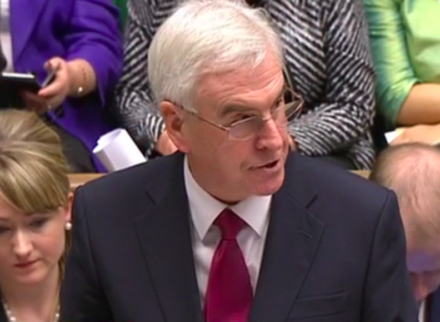
The Institute of Fiscal Studies today presented their assessment of the parties’ manifestos. They made it absolutely clear that the choice between the two parties is huge: more years of austerity with the Tories, stretching well into the next decade – or investment and properly funded public services with Labour, in an economy that works for the many, not the few.
We knew that the Tory manifesto was completely uncosted and now we know why: because they are essentially offering more of the same failed approach as Cameron and Osborne. The IFS say this would mean “big cuts in welfare spending” and “another parliament of austerity for the public services, including an incredibly challenging period for the NHS and cuts to per pupil funding in schools.”
Schools funding will fall by an astonishing seven per cent under the Tories’ plans. After seven failed years of Tory austerity, with public services like the NHS in their worst ever crisis, we simply cannot afford another year like this – let alone a whole parliament or more.
Researchers at the Institute, in contrast, showed Labour’s plans would mean significantly more spending than the Tories in higher education, childcare, schools, health, and welfare – which the next Labour will pay for by taxing the top five per cent and corporations. What is more, we will do so while, guaranteeing no increases in income tax and National Insurance Contributions for the 95 per cent, and no increases in VAT. Labour believes that the broadest shoulders in society can, and should, carry a fair share of the burden of our public services. We will use the extra revenue to reverse years of Tory spending cuts.
But even allowing for the IFS’ less generous estimate of the amounts that can be raised from taxing the five per cent and the corporations, their analysis shows that Labour’s plans are fiscally sound. In their estimate, the next Labour government would be on course to both rapidly shrink the deficit on day-to-day spending, and leave the country with a lower debt burden at the end of the next parliament than at its start.
Labour made sure that every single proposal in our manifesto was fully costed, and used independent expert advice to back up every claim we made. All our spending and taxation plans are presented in our “Funding Britain’s Future” document. No other party comes close to offering the same level of detail, least of all the Tories –the only numbers to appear in their manifesto are page numbers.
We don’t agree with those who say that it is not possible to tax the super-rich, or corporations. We know it is harder than squeezing ordinary households. A substantial tax avoidance industry has grown up to help those mega-rich and corporations that want to duck their tax obligations to society, as the Panama Papers and other leaks have exposed. So it may be easier for the Tories to tax ordinary working people through stealth taxes, like the shocking rise in cremation and burial fees, and let their big business backers off the hook, but Labour won’t duck out of taking on the tax dodgers. That’s why we presented a comprehensive tax transparency and enforcement programme, backed up by extra funding for HMRC after years of self-defeating Tory cuts.
And the IFS also confirmed that Labour’s national transformation fund, ready to invest across the whole country in vital infrastructure like transport, would, when it is well-spent, “increase the productive capacity of the UK economy”. Unlike the Tories, Labour is ambitious for our every part of country. We think years of underinvestment has been holding too many of us back. We can unlock the potential that is currently being wasted, and build an economy that works for the many, not the few.
John McDonnell is shadow chancellor.




More from LabourList
Restoration announce recommendations for NEC candidates
‘Factionalism at the top is weakening Labour – and handing a gift to Reform’
‘Europe must stand strong on its own as US security guarantees grow conditional’